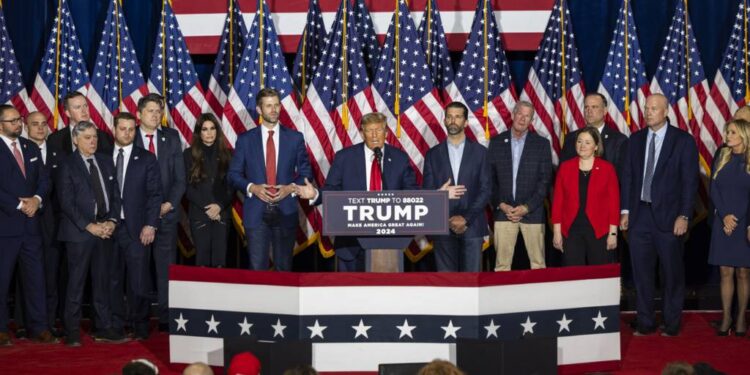Donald Trump has secured a resounding victory in the inaugural electoral event of the 2024 U.S. election season, decisively overcoming a narrowed field of Republican contenders in the Iowa caucuses.
The Associated Press swiftly declared Trump the winner, highlighting his considerable lead in the race even as voting continued across much of the state.
Addressing supporters after the confirmation of his victory, the former president lamented a perceived decline in the nation over the past three years and outlined a series of pledges for his potential second term. These commitments included a commitment to extensive drilling activities and endowing police officers with full legal immunity.
The contest for the runner-up position unfolded over an extended period, with Ron DeSantis securing a surprising victory over Nikki Haley.
With approximately 99% of the vote tallied, Trump held a commanding lead at 51%, followed by DeSantis at 21.2% and Haley at 19.1%. Trump’s margin of victory surpassed the previous record in competitive Republican presidential races in Iowa, standing at 12 percentage points.
Governor DeSantis of Florida employed a traditional Iowa campaign strategy, visiting all 99 counties in the hopes of garnering support akin to past successful candidates. In contrast, Nikki Haley, the former South Carolina governor, was considered a more moderate Republican option, with perceived potential to pose a stronger challenge to Joe Biden in the general election than candidates further to her right.
Despite DeSantis’ distant second-place finish behind Trump, the unexpectedly robust showing could inject momentum into his campaign. Acknowledging the challenges faced, DeSantis asserted that the campaign had secured its ticket out of Iowa, preserving its viability for future battles.
Despite significant time and financial investments in Iowa, the performance of the candidate under discussion proved to be suboptimal. Nevertheless, the candidacy has persevered, with the candidate expressing confidence in moving forward. Governor DeSantis remarked, “We’ve got our ticket punched out of Iowa.”
Three other candidates lagged considerably behind DeSantis and Haley, securing only single-digit percentages. Businessman Vivek Ramaswamy led this group until he withdrew from the race on Monday night, subsequently endorsing Trump. Following him were Asa Hutchinson, the former governor of Arkansas, and pastor Ryan Binkley.
The Iowa Republican party chairman, Jeff Kaufmann, estimated that around 100,000 Republicans participated in the caucuses on Monday, a notably lower turnout compared to 2016.
Severe winter weather posed challenges for voters, with sub-zero temperatures, bitter winds, and snow drifts affecting the caucus locations. Some individuals may have faced difficulties accessing their precincts due to road closures and other impediments.
Among Trump’s steadfast supporters, concerns about the former president’s legal issues and potential threats to democracy were often dismissed. A retired farmer, Ron Osborn, cited Trump as the candidate best equipped to defeat what he perceived as “cheating Democrats.
73-year-old, asserted, “I believe he is the sole contender capable of overcoming the perceived electoral improprieties of the Democratic Party.”
Individuals who opted for alternative candidates expressed disenchantment with the tumultuous nature of Trump’s governance, aiming to progress beyond the disruptive characteristics associated with his political style. Kent Christen, a voter from Cedar Rapids supporting DeSantis, articulated his fatigue with Trump, remarking, “Chaos appears to follow him. He functions as an instrument of disorder. I find myself increasingly fatigued by such dynamics, constituting my primary disapproval.”
The commencement of the 2024 election cycle is marked by the Iowa contest, with prognostications anticipating an eventual electoral rematch between Trump and Biden in the primary season
Throughout the initial stages of the Republican electoral process, Trump maintained an unwavering dominance, with fervent supporters participating in rallies and grassroots initiatives. Despite persisting legal challenges and an escalating use of acerbic rhetoric by the former president during the campaign, which centered on a second term focused on reprisals against political adversaries, his position remained formidable. Notably, the looming specter of political violence poses a concern, with officials and judges encountering escalating instances of harassment.
Attention now shifts to New Hampshire, the subsequent primary contest on the Republicans’ political agenda. Concurrently, Democrats have opted to forego participation in the Granite State, selecting South Carolina as their inaugural official contest on the left. It is pertinent to note that candidates opposing the incumbent president remain on the ballot in South Carolina.
















